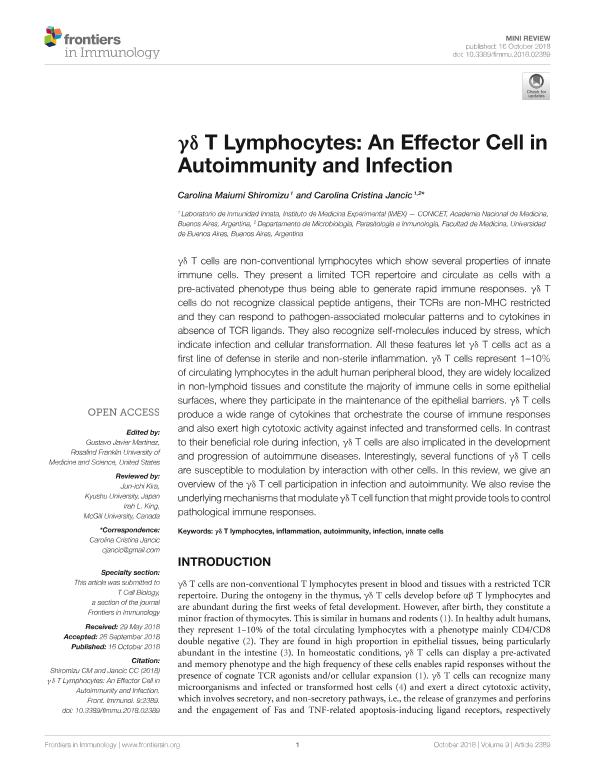Mostrar el registro sencillo del ítem
dc.contributor.author
Shiromizu, Carolina Maiumi

dc.contributor.author
Jancic, Carolina Cristina

dc.date.available
2020-01-07T21:26:12Z
dc.date.issued
2018-10
dc.identifier.citation
Shiromizu, Carolina Maiumi; Jancic, Carolina Cristina; γδ T lymphocytes: An effector cell in autoimmunity and infection; Frontiers Media SA; Frontiers in Immunology; 9; 10-2018; 1-8
dc.identifier.issn
1664-3224
dc.identifier.uri
http://hdl.handle.net/11336/93927
dc.description.abstract
γδ T cells are non-conventional lymphocytes which show several properties of innate immune cells. They present a limited TCR repertoire and circulate as cells with a pre-activated phenotype thus being able to generate rapid immune responses. γδ T cells do not recognize classical peptide antigens, their TCRs are non-MHC restricted and they can respond to pathogen-associated molecular patterns and to cytokines in absence of TCR ligands. They also recognize self-molecules induced by stress, which indicate infection and cellular transformation. All these features let γδ T cells act as a first line of defense in sterile and non-sterile inflammation. γδ T cells represent 1-10% of circulating lymphocytes in the adult human peripheral blood, they are widely localized in non-lymphoid tissues and constitute the majority of immune cells in some epithelial surfaces, where they participate in the maintenance of the epithelial barriers. γδ T cells produce a wide range of cytokines that orchestrate the course of immune responses and also exert high cytotoxic activity against infected and transformed cells. In contrast to their beneficial role during infection, γδ T cells are also implicated in the development and progression of autoimmune diseases. Interestingly, several functions of γδ T cells are susceptible to modulation by interaction with other cells. In this review, we give an overview of the γδ T cell participation in infection and autoimmunity. We also revise the underlying mechanisms that modulate γδ T cell function that might provide tools to control pathological immune responses.
dc.format
application/pdf
dc.language.iso
eng
dc.publisher
Frontiers Media SA

dc.rights
info:eu-repo/semantics/openAccess
dc.rights.uri
https://creativecommons.org/licenses/by/2.5/ar/
dc.subject
AUTOIMMUNITY
dc.subject
INFECTION
dc.subject
INFLAMMATION
dc.subject
INNATE CELLS
dc.subject
γδ T LYMPHOCYTES
dc.subject.classification
Inmunología

dc.subject.classification
Medicina Básica

dc.subject.classification
CIENCIAS MÉDICAS Y DE LA SALUD

dc.title
γδ T lymphocytes: An effector cell in autoimmunity and infection
dc.type
info:eu-repo/semantics/article
dc.type
info:ar-repo/semantics/artículo
dc.type
info:eu-repo/semantics/publishedVersion
dc.date.updated
2019-10-18T18:03:28Z
dc.journal.volume
9
dc.journal.pagination
1-8
dc.journal.pais
Suiza

dc.journal.ciudad
Lausanne
dc.description.fil
Fil: Shiromizu, Carolina Maiumi. Consejo Nacional de Investigaciones Científicas y Técnicas. Instituto de Medicina Experimental. Academia Nacional de Medicina de Buenos Aires. Instituto de Medicina Experimental; Argentina
dc.description.fil
Fil: Jancic, Carolina Cristina. Consejo Nacional de Investigaciones Científicas y Técnicas. Instituto de Medicina Experimental. Academia Nacional de Medicina de Buenos Aires. Instituto de Medicina Experimental; Argentina. Universidad de Buenos Aires. Facultad de Medicina. Departamento de Microbiología. Cátedra de Microbiología, Parasitología e Inmunología; Argentina
dc.journal.title
Frontiers in Immunology
dc.relation.alternativeid
info:eu-repo/semantics/altIdentifier/doi/http://dx.doi.org/10.3389/fimmu.2018.02389
dc.relation.alternativeid
info:eu-repo/semantics/altIdentifier/url/https://www.frontiersin.org/articles/10.3389/fimmu.2018.02389/full
Archivos asociados
